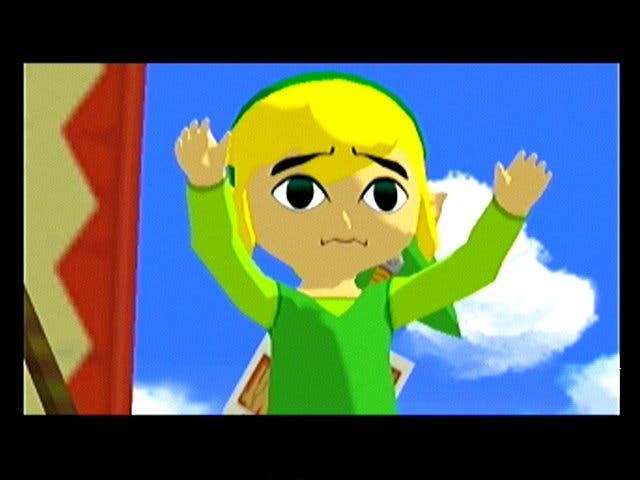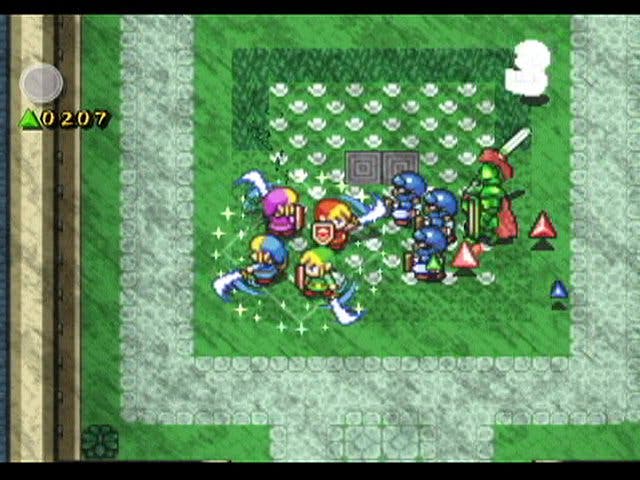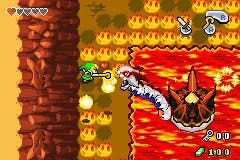The History of Zelda - Part 2
Gratuitous Linkage.
The Legend of Zelda: The Wind Waker, 2002
"Wow. What's with that get-up?"
Zelda games have actually always been innovators in terms of their artistic direction and general style, but Wind Waker stands out as the most controversial of the series' aesthetic transformations. Bad things were said when Link's flat-faced new look was revealed to the world, but it turned out to suit the game's spirit perfectly and will probably be remembered as a standout example of artistic style in videogames. Wind Waker will never age; by simplifying its appearance, it manages to make everything look perfect in its own way, and because it doesn't attempt realism, there are no jarring rough edges or imperfect landscapes or robotic-looking characters. It looks seamless and gorgeous from beginning to end, and the style conveys gloom and atmosphere just as well as the endless blue sea and bright sun of the overworld - the moment were Link descends into the sunken ruins of Hyrule Castle is, visually at least, the most spectacular set-piece in the series.
The new look wasn't the only surprise that Wind Waker had in store for Zelda fans. It did away with Hyrule entirely (or so it seemed), throwing players into an unfamiliar, flooded world with no Triforce or Ganon or Zelda and a boyish, innocent new Link quite unlike OoT and Majora's Mask's vaguely troubled, orphaned hero. It readjusted the balance between action and puzzling and placed an even greater emphasis on exploration than any Zelda before it. Charting the seas at leisure and discovering lost islands is the greatest pleasure that Wind Waker has to offer. It feels very back-to-roots; Wind Waker reemphasises the importance of childish pleasures in games, pleasures like waiting until a mean old miser wanders out of earshot before breaking all his plates, or throwing pigs into the sea to see how far they float, or sailing off in any direction at all just to see what might be out there.

Generally, Wind Waker isn't defended as vehemently from criticism as Ocarina of Time or Majora's Mask. Critics lambast Wind Waker's relatively short lifespan and half-baked later dungeons, it wasn't as enormous an evolution for the series as OoT, and trawling for Triforce pieces later on in the game was enough to put some people off it altogether. But despite all of that, if I were to choose a favourite from among the Zelda games, it would probably be Wind Waker. Released at a time when games were beginning to get a little bit stale for me, it reinvigorated my love of gaming, and I liked that it was shorter and marginally less demanding than its predecessors - it felt more inclusive. It goes right back to the little pleasures and the childish messing about that make the Zelda games special, giving you an enormous selection of bright, colourful things to play with and different things to do. Wind Waker is very true to itself, and true to its heritage - it wasn't pretending to be all clever and grown up and mature, as was amply demonstrated by the bright and beautiful cartoon-influenced visual style. It was bold and fun and gloriously childish. As the old Hyrule was swept away by a massive rush of water at the end of the game, along with its king and its age-old tormentor, it felt like a farewell to the ancient story of Ganon and the Triforce - a signalling of a new beginning for the series after nearly twenty years. It takes some bravery to change things so drastically within a series as well-loved and long-established as Zelda, but Wind Waker pulls it off.
The Legend of Zelda: Four Swords Adventures, 2004
"It looks familiar, but in truth it is very different"
Four Swords Adventures is perhaps the most underrated of the Zelda games. Many fans dismissed it as a spin-off, and given the truly ludicrous amount of Nintendo equipment needed for the multiplayer (four GBAs, four link cables, a copy of the game, a GameCube and a reasonably big telly), very few people actually got to experience it as it was intended. However, with at least two excitable friends and a few free Friday nights, this is probably the most fun that can possibly be had with any Zelda game. Competitive and co-operative in equal measure, Four Swords Adventures is riotously enjoyable with friends - if you've never experienced it, I really must urge you to pick up some GBAs and link cables and give it ago. Three extra GBAs would probably only cost you about thirty quid these days.

This is the only game that ever really took advantage of the link-up capabilities between the GBA and the GameCube, dropping Link into the GBA screen whenever he entered a cave or stepped on a portal to the Dark World. It requires some remarkable co-ordination sometimes - the best puzzles need one or two players to figure something out on the main screen whilst the others wandered around the Dark World on their GBAs, explaining what needed to be done. Having four minds at work adds a whole extra dimension to the classic Zelda puzzles and necessitates a new way of thinking that is consistently delightful to fans and newcomers alike. Four Swords is probably at its best when everyone is working together to think around a puzzle, but it's equally enjoyable when you're falling over each other in a mad race for Force Gems or ganging up on the one who's hogging all the glory or arguing over which way to go next or who gets to have the Fire Rod or which cave to explore ('No really, in Link to the Past there were ALWAYS secret things under bushes, trust me!'). It really is fantastic fun, and one of the most rewarding multiplayer experiences in existence.
In many ways, Four Swords Adventures is like a multiplayer version of Link to the Past, and in my opinion it's just as good (if considerably more short-lived). Aesthetically, it is a splendorous coming-together of Zelda past and Zelda present, blending LttP-esque sprites and design and environments and music with beautiful Wind Waker colouring and swirl effects and cel-shaded 3D. It looks absolutely glorious, like a Zelda artistic-direction Best Of, and it plays like a series Best Of too - here are all the best elements of Link to the Past, but, wonderfully, you can really share them with other people rather than just babbling on about them to uncomprehending friends. It might not be the most influential or significant of the games in the Zelda series, but under the right circumstances, Four Swords is easily the most downright fun of them.
The Legend of Zelda: The Minish Cap, 2004
"But surely, this is not the end..."

Unlike every other handheld Zelda, The Minish Cap actually stays in Hyrule for its duration, but it's not entirely clear where it fits in with the rest of the games. This is a Hyrule untroubled by Ganon and the Triforce, the same Hyrule as that of Four Swords Adventures and the GBA Link to the Past 'bonus' Four Swords multiplayer element. It manages to transpose Wind Waker's visual style into 2D admirably well, although as a result of the GBA's relative feebleness, it doesn't come close to the beauty of Four Swords Adventures.
Without the Four Swords Adventures' multiplayer hook to distract you from the plot and setting, though, Minish Cap's premise feels noticeably flat compared to the console games' epic quests and the other handheld titles' strange little parallel universes. Thankfully, all the other hallmarks of a 2D Zelda are there, including the huge amount of side-quests and optional diversions, and the Four Sword and miniature Picori dimension are noble attempts to reinvigorate what is now a very old (though still tremendously enjoyable) template. Minish Cap is the most expansive handheld Zelda yet, and indeed it may well be the very last true 2D Zelda now that the DS has made 3D handheld adventuring possible (at least in part).
No new Zelda game has been released since Minish Cap, and it seems that it might be the last of the old-fashioned Zeldas. Though Twilight Princess undeniably hearkens back to Ocarina of Time in its artistic direction and slightly dark atmosphere, it seems to me that we are nonetheless standing on the brink of something new for this series, a new energy that was abundantly evident in Wind Waker. Fifteen years since I first played a Legend of Zelda game, this superb series is still surprising and delighting me as much as it did when I was seven, where even Mario and Sonic have faltered. It's astounding, it really is.
